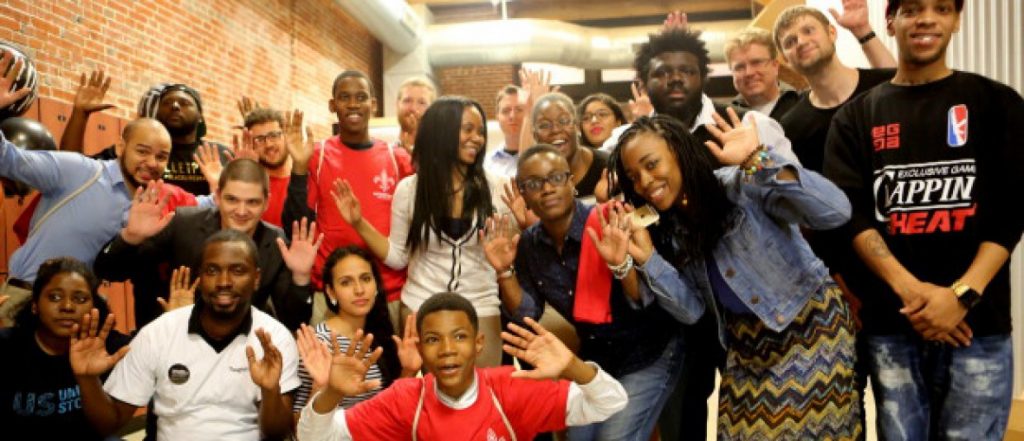FIRST POST: TRUMP CARDS
- MICAH L. SIFRY
- August 19, 2015
- 9:14 am
Why to take Donald Trump seriously; Lawrence Lessig’s open source campaign; and warnings about the Internet’s future.
Tech and the Presidentials: Just as the Obama campaign collected the mobile phone numbers of tens of thousands of supporters attending his mass rallies, candidates like Bernie Sanders and Hillary Clinton are looking to the text message channel as the best way to communicate with their core supporters, Nick Corasaniti reports for The New York Times.
Politico’s Annie Karni reports on concerns among Clinton allies that her response to the ongoing questions about her private email server is too legalistic.
Wondering why Donald Trump is doing so well in Republican primary polling? Political scientist Lee Drutman argues in Vox that its because he’s in tune with a sizable chunk of the public: populists who want to reduce immigration AND protect Social Security, who may be as many as 40% of the overall electorate. What holds these two positions together is a “turning inward” mood led by Americans fearful that their middle class standard of living is disappearing. (Republican business elites who favor cutting Social Security while taking a more liberal view of immigration are deeply out of touch with their party’s base, he adds.)
If you subtract Trump’s demagoguery on immigration from the picture, he’s somewhat more moderate than most of the other Republican contenders, Josh Barro argues for The Upshot. He cites Trump’s statements and positions on taxes (he hasn’t signed Grover Norquist’s pledge to never raise them) abortion (he favors allowing it in cases of rape or incest), and trade (he’s not a free trader) as example.
My view: If Trump starts talking up his call to eliminate the inheritance tax in exchange for a one-time mega-tax on the mega-rich (14.25% on individuals and trusts worth $10 million or more), which he made in his 2000 book, The America We Deserve [h/t to Daily News columnist Errol Louis for the long memory], and keeps talking about how all the other top GOP candidates are too beholden to their billionaire Super PAC backers to call for anything similar, he could take the Republican base away from the party establishment entirely and win the GOP nomination. And if he fails at that goal, the Commission on Presidential Debates will be hard pressed to exclude him from the general election debates if he runs as an independent, since he’s highly likely to be above 15% in the polls if he keeps campaigning.
All of the software that Lawrence Lessig’s 2016 presidential campaign makes will be released “under the GPL 3.0 open-source licence [sic]”, and all creative materials will be released “under the Creative Commons Attribution Share-Alike 4.0 licence [sic]”, his exploratory committee announced. We have no idea why his organisation is honouring Her Majesty’s English.
Ross Choma reminds us in Mother Jones that most online political advertising is essentially unregulated compared to TV or print ads, where the names of the organization paying for them have to be disclosed.
Future, Imperfect: Jennifer Granick, the director of civil liberties at Stanford Law School’s Center for Internet and Society, gave a powerful keynote at the Black Hat 2015 conference earlier this month. She’s posted a modified version of her talk on Medium, entitled “The end of the Internet dream.” She warns: “For better or for worse, we’ve prioritized things like security, online civility, user interface, and intellectual property interests above freedom and openness. The Internet is less open and more centralized. It’s more regulated. And increasingly it’s less global, and more divided. These trends: centralization, regulation, and globalization are accelerating. And they will define the future of our communications network, unless something dramatic changes.” (h/t David Isenberg)
Hackers who stole user information from the adult cheating site AshleyMadison.com have now posted the data on the dark web, Kim Zetter reports for Wired.com.
This is civic tech: Congrats to Civic Hall member company Citymart, which has been hired by New York City to help make its procurement processes more flexible and open to smaller vendors and new technologies, as Miranda Neubauer reports for Capital New York.
The FCC has fined Smart City $750,000 for blocking people attending conventions from using their personal mobile WiFi hotspots and forcing them to pay for Smart City’s Wi-Fi, Sarah Lawson reports for Fast Company.


